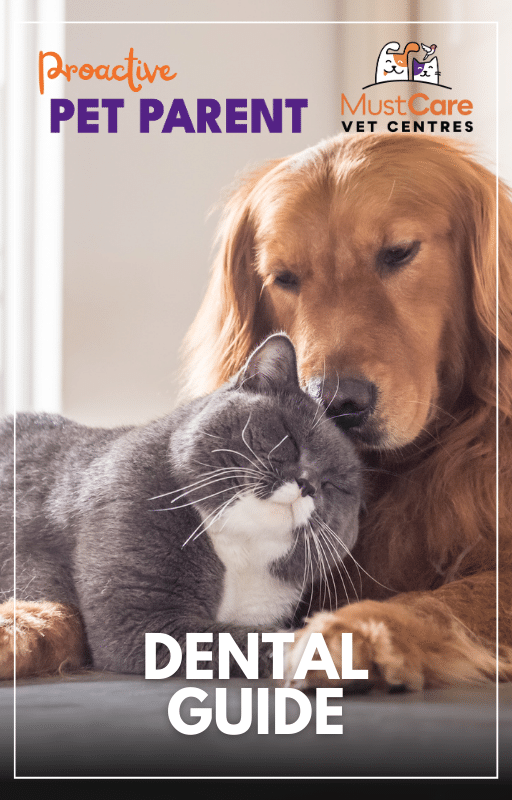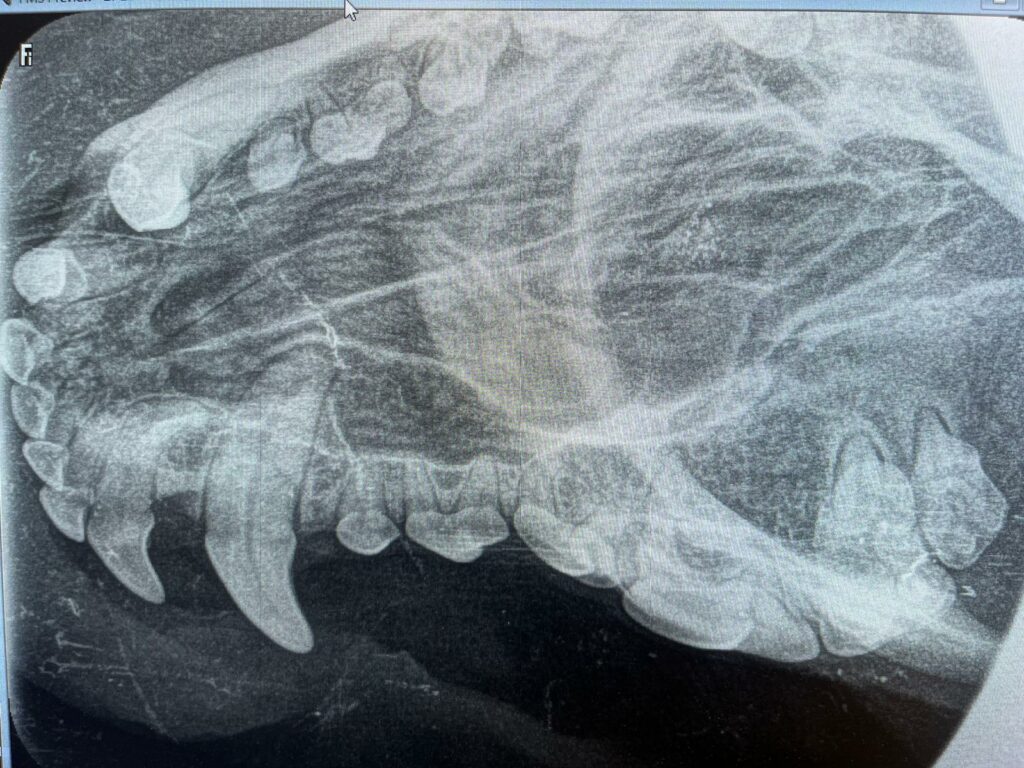Share This Blog With Other Pet Parents!
Tackling Pet Bad Breath: Causes and Veterinary Dental Care Solutions
Have you ever cuddled up with your furry companion only to recoil at the waft of bad breath? You’re not alone! Many pet owners face this issue, unaware that bad breath can be a sign of underlying health concerns.
While a certain level of oral odour is normal, consistent bad breath warrants attention. This article delves into the common causes of bad breath in pets and highlights how professional veterinary dental care is a necessity for our pets. Whether it’s a dental disease or dietary indiscretion, understanding the root of the problem is the first step towards a solution. Timely intervention by veterinary dental experts can not only alleviate bad breath but also significantly improve your pet’s overall health and quality of life.
What you’ll learn from this blog:

For all you need to know, download our
FREE Dental Guide
This blog is part of our Proactive Pet Parent series! This is just the beginning… To see more blogs, click here! Better yet, sign-up to our newsletter to receive these directly to your inbox each month.
Sign-up To The Proactive Pet Parent Newsletter
Understanding Pet Bad Breath: More Than Just an Unpleasant Odour
In an era where pet ownership is on the rise, our furry companions have become more than just animals; they are family. A significant part of cherishing this bond is ensuring the health and well-being of our pets, which undeniably includes their oral health.
Unfortunately, oral hygiene is often overshadowed by other health concerns, leaving many pet owners oblivious to the implications it holds. The topic of bad breath in pets, though seemingly trivial, serves as a window into the broader spectrum of pet health. It’s a common issue pet owners encounter, but its causes and solutions are not as commonly known.
The Importance of Oral Health in Pet Ownership
Your pet’s bad breath can be more than just an unpleasant experience; it could be a cry for help. Our pets cannot articulate their discomfort or ailments, making it imperative for pet owners to be vigilant about signs like bad breath. A persistent odour could be indicative of dental diseases like periodontitis or even systemic issues like diabetes or kidney disease.
It can be difficult to distinguish normal from abnormal, so understanding when to seek professional help, and navigating the plethora of information online (we see you Dr Google!) are common hurdles. The questions are endless: What causes bad breath in pets? How can it be prevented? What home remedies are effective, and when is it time to see a vet? Amidst a busy life, finding reliable, straightforward, and actionable information can feel like looking for a needle in a haystack.
Veterinary care, while essential, can be a significant financial investment. However, prevention and intervention is the key – the cost of leaving an untreated dental issue to fester may end up costing even more.
Identifying the Causes of Pet Bad Breath
Here are some common causes of bad breath in pets:
Dental Diseases:
- Periodontal disease is a prevalent cause. It begins with the buildup of plaque, leading to tartar formation, gum inflammation, and if left unchecked, severe dental issues.
- Gingivitis, another common dental ailment, also presents with bad breath.
Dietary Indiscretions:
- Pets often have a knack for scavenging. Consuming decomposing organic matter or trash could result in pet bad breath.
Systemic Health Issues:
- Conditions like diabetes, kidney disease, or gastrointestinal issues can manifest through bad breath.
Oral Foreign Bodies:
- Sometimes, foreign objects like bones or sticks may get lodged in a pet’s mouth causing discomfort and bad breath. If you suspect your pet is suffering from an oral foreign body it is crucial to speak to your veterinarian immediately, as this may result in breathing difficulties.
Here are some additional signs pet owners should be vigilant about in addition to persistent bad breath:
- Difficulty eating or reduced appetite
- Excessive drooling
- Swollen or bleeding gums
- Loose or missing teeth
The Role of Veterinary Dental Care
Your veterinarian will help you identify the cause of your pet’s bad breath. Self-diagnosis or treatment without professional guidance can sometimes do more harm than good, so it’s important to understand the role your veterinarian will play in helping you address your pet’s dental health.
Veterinary dental care is not just about addressing the current issue but also about preventive care. Your veterinarian will discuss with you a comprehensive approach to managing your pet’s oral health. Professional dental cleaning is recommended at least once per year as part of a preventative dental plan, and could help to unearth underlying dental issues. Home dental care routines, such as brushing your pet’s teeth every day, are beneficial, however they are not a substitute for professional veterinary dental care.
Balancing Cost and Care in Pet Dental Health
Veterinary dental care can be expensive. However, neglecting oral health to save on immediate costs could lead to more severe health issues and higher expenses down the track. It’s a delicate balance between cost and care, one that requires informed decisions and your veterinarian will be able to outline these costs for you as part of your pet’s preventative dental treatment plan.
As a guide, you could expect at least one annual dentist check-up at your veterinarian each year. MustCare Vet Centres provide this service free of charge to clients, and offer competitive dentistry care including surgical options. However, prevention and intervention is the key – our aim is for your pet to keep as many teeth as possible, for as long as possible!
Practical Steps to Tackle Pet Bad Breath
- Identify the Cause:
– Observation: Be vigilant in noticing changes in your pet’s behaviour or eating habits, as these could be indicative of oral discomfort.
– Regular Check-ups: Schedule regular veterinary check-ups to catch any early signs of dental disease or other issues manifesting as bad breath. - Professional Dental Care:
– Dental Cleaning: Professional dental cleaning is crucial. It helps in removing tartar, checking for dental diseases, and addressing any existing oral issues. If it’s been a while since your pet has had a dental cleaning or check-up, consider booking one as soon as possible.
– Treatment of Underlying Conditions: If bad breath is due to systemic conditions like diabetes or kidney issues, your vet can provide a treatment plan to manage these conditions effectively. - Home Dental Care:
– Brushing: Regular brushing with pet-safe toothpaste can prevent plaque buildup. There are several options available on the market and your veterinarian will be able to guide you to their preferred brand. Do not use human toothpaste as they may contain xylitol, which is toxic for pets.
– Dental Treats and Toys: Provide dental treats and toys that promote chewing, which in turn, helps in cleaning the teeth naturally.
– Water Additives: Use vet-recommended water additives to help maintain fresh breath and good oral hygiene. - Diet Management:
– Quality Food: Provide high-quality, balanced diet to ensure your pet’s digestive system is functioning well, which in turn, can help to reduce bad breath. - Education and Awareness:
– Stay Informed: Keep yourself updated with reliable information on pet oral health, and don’t hesitate to ask your vet questions during check-ups. - Economic Considerations:
– Insurance: Consider getting pet insurance that covers dental care to mitigate the costs of veterinary dental services.
– Preventive Care: Investing in preventive care like regular brushing, annual dental check-ups at your local vet, and providing dental treats can save on costly treatments in the long run. - Continued Monitoring:
– Maintain a Routine: Establish a routine for dental care both at home and professionally.
– Keep Records: Document your pet’s dental care routine, any issues, and the treatments provided for future reference. Take note of any symptoms you notice such as a disinterest in food (and don’t forget to note down what food you offered to your pet – as this may make all the difference).
Exploring these aspects as well as understanding products and services available to you from your veterinarian will help tackle the issue of pet bad breath.
As always, if you have any questions for the veterinary team at MustCare, please get in touch with us today.

